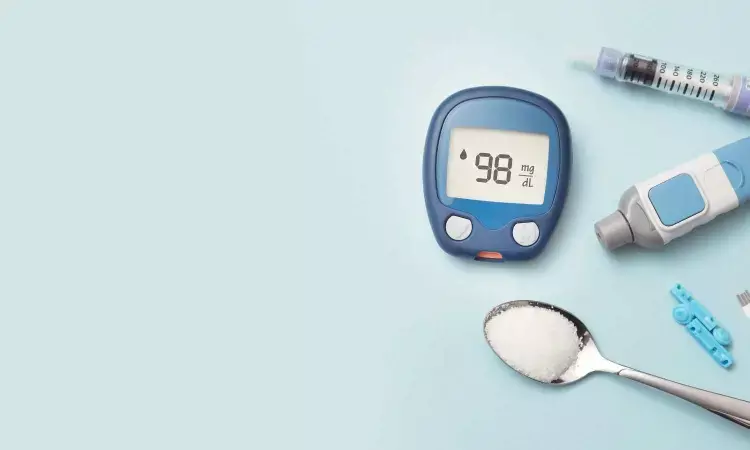- Home
- Medical news & Guidelines
- Anesthesiology
- Cardiology and CTVS
- Critical Care
- Dentistry
- Dermatology
- Diabetes and Endocrinology
- ENT
- Gastroenterology
- Medicine
- Nephrology
- Neurology
- Obstretics-Gynaecology
- Oncology
- Ophthalmology
- Orthopaedics
- Pediatrics-Neonatology
- Psychiatry
- Pulmonology
- Radiology
- Surgery
- Urology
- Laboratory Medicine
- Diet
- Nursing
- Paramedical
- Physiotherapy
- Health news
- Fact Check
- Bone Health Fact Check
- Brain Health Fact Check
- Cancer Related Fact Check
- Child Care Fact Check
- Dental and oral health fact check
- Diabetes and metabolic health fact check
- Diet and Nutrition Fact Check
- Eye and ENT Care Fact Check
- Fitness fact check
- Gut health fact check
- Heart health fact check
- Kidney health fact check
- Medical education fact check
- Men's health fact check
- Respiratory fact check
- Skin and hair care fact check
- Vaccine and Immunization fact check
- Women's health fact check
- AYUSH
- State News
- Andaman and Nicobar Islands
- Andhra Pradesh
- Arunachal Pradesh
- Assam
- Bihar
- Chandigarh
- Chattisgarh
- Dadra and Nagar Haveli
- Daman and Diu
- Delhi
- Goa
- Gujarat
- Haryana
- Himachal Pradesh
- Jammu & Kashmir
- Jharkhand
- Karnataka
- Kerala
- Ladakh
- Lakshadweep
- Madhya Pradesh
- Maharashtra
- Manipur
- Meghalaya
- Mizoram
- Nagaland
- Odisha
- Puducherry
- Punjab
- Rajasthan
- Sikkim
- Tamil Nadu
- Telangana
- Tripura
- Uttar Pradesh
- Uttrakhand
- West Bengal
- Medical Education
- Industry
Treatment of patients with diabetes and CKD: Key takeaways from KDIGO guidelines

The latest clinical practice guideline from the Kidney Disease: Improving Global Outcomes (KDIGO) organization offers advice for treating patients with diabetes and chronic kidney disease (CKD).
A synopsis published in Annals of Internal Medicine focuses on the key recommendations pertinent to the following issues: comprehensive care, glycemic monitoring and targets, lifestyle interventions, antihyperglycemic therapies, and educational and integrated care approaches to management.
The KDIGO guideline update is based upon literature searches last conducted in December 2021, limiting the searches to randomized controlled trials only, and updated these searches in February 2022 at the time of the public review. The evidence synthesis and meta-analysis methods undertaken for the KDIGO 2020 Clinical Practice Guideline for Diabetes Management in Chronic Kidney Disease were followed for the 2022 guideline update.
Authors from the KDIGO Work Group summarized the guideline update for ease of reference in clinical practice. The update recommends:
• a layered approach to care, starting with a foundation of lifestyle interventions and first-line pharmacotherapy demonstrated to improve clinical outcomes;
• the serial introduction of medications that improve intrarenal hemodynamics (such as RAS inhibitors, SGLT2 inhibitors, MRAs, diuretics, and other antihypertensive medications);
• that health care providers should focus on preserving kidney function and maintaining well-being rather than replacing kidney function; and
• that policymakers and institutional decision makers implement team-based, integrated care focused on risk evaluation and patient empowerment to provide comprehensive care for patients with diabetes and CKD.
Key takeaways include -
1. Patients with diabetes and CKD have multisystem disease that requires treatment including a foundation of lifestyle intervention (healthy diet, exercise, weight management, no smoking) and drug therapy that improves kidney and cardiovascular outcomes (glucose, lipids, blood pressure).
2.Patients should consume a balanced, healthy diet that is high in vegetables, fruits, whole grains, ber, legumes, plant-based proteins, unsaturated fats, and nuts; and lower in processed meats, refined carbohydrates, and sweetened beverages. Sodium (<2 g/day) and protein intake (0.8 g/kg/day) in accordance with recommendations for the general population.
3. HbA1c should be measured regularly. Reliability decreases with advanced CKD, particularly for patients treated with dialysis, and results should be interpreted with caution.
4. CGM or SMBG may also be useful, especially for treatment associated with risk of hypoglycemia. Targets for glycemic control should be individualized, ranging from <6.5% to <8.0%.
5. SGLT2i should be initiated for patients with T2D and CKD when eGFR is ≥20 ml/min/1.73 m2 and can be continued after initiation at lower levels of eGFR. SGLT2i markedly reduce risks of CKD progression, heart failure, and atherosclerotic cardiovascular diseases, even when blood glucose is already controlled.
6.Metformin should be used for patients with T2D and CKD when eGFR is ≥30 ml/min/1.73 m2 For such patients, metformin is a safe, effective, and inexpensive drug to control blood glucose and reduce diabetes complications.
7.In patients with T2D and CKD who have not achieved individualized glycemic targets despite use of metformin and SGLT2i, or who are unable to use those medications, a long-acting GLP-1 RA is recommended as part of the treatment.
8.Patients with T1D or T2D, hypertension, and albuminuria (persistent ACR ≥30 mg/g) should be treated with a RAS inhibitor (ACEi or ARB), titrated to the maximum approved or highest tolerated dose. Serum potassium and creatinine should be monitored.
9.A team-based and integrated approach to manage these patients should focus on regular assessment, control of multiple risk factors, and structured education in self-management to protect kidney function and reduce risk of complications.
10.There is a paucity of data on optimal management of diabetes in kidney failure, including dialysis and transplantation, which should be one important focus for future studies.
For further reference log on to: https://kdigo.org/guidelines/diabetes-ckd.
Dr Kamal Kant Kohli-MBBS, DTCD- a chest specialist with more than 30 years of practice and a flair for writing clinical articles, Dr Kamal Kant Kohli joined Medical Dialogues as a Chief Editor of Medical News. Besides writing articles, as an editor, he proofreads and verifies all the medical content published on Medical Dialogues including those coming from journals, studies,medical conferences,guidelines etc. Email: drkohli@medicaldialogues.in. Contact no. 011-43720751


